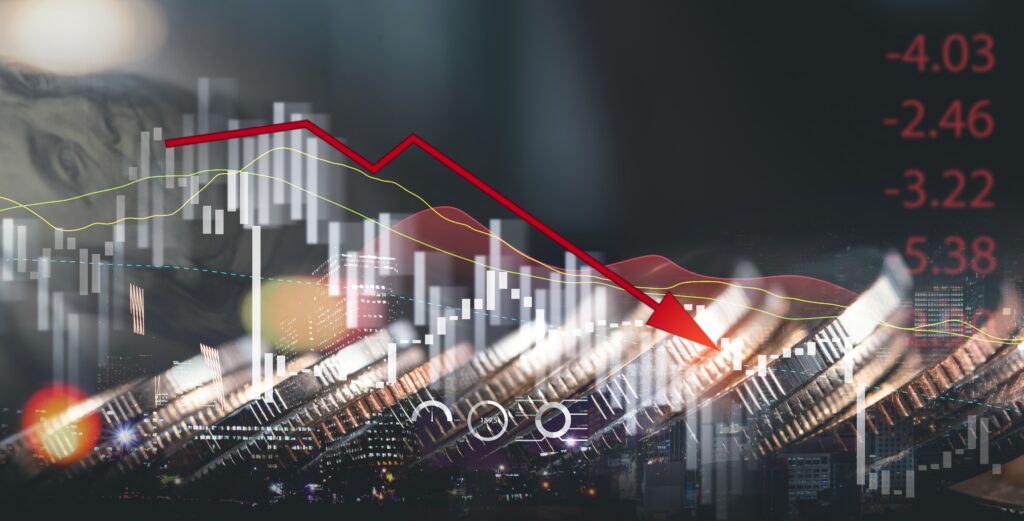The global economy took a sharp hit this week as a new wave of US tariffs triggered a fast and fierce response from China. New 10% tariffs, rising fears of recession, and China’s harsh retaliation shake the world economy. Investors worldwide reacted with fear. Markets dropped hard, and fears of a trade war turned into talk of a full-blown global slowdown.
On Friday, China fired back at the US by placing a steep 34% import tax on American products. It also cut off exports of rare minerals that are key to making phones and electric cars. The move followed President Donald Trump’s surprise announcement of new 10% tariffs on goods from many countries—including China, Vietnam, and the European Union.
Beijing called the US move unfair. Chinese leaders said the tariffs broke global trade rules and accused Trump of using “economic threats” to bully other nations.
As the tit-for-tat fight grew, Wall Street sank. The S&P 500 fell nearly 6% in just one week, marking its worst performance since the 2020 market crash caused by the Covid pandemic. The Dow Jones and Nasdaq also saw losses above 5%.
In Europe, the UK’s FTSE 100 dropped almost 5%, its largest one-week fall in five years. Germany and France also saw big dips. Asian markets closed the week deep in the red.
Despite the fear, Trump brushed off the panic. He told the public to “hang tough,” saying that the US job market is still strong. “We can’t lose,” he posted online, adding that America must stand firm to fix broken trade systems.
US Companies Hit Hard
Big companies like Apple and Nike were among the first to feel the squeeze. Apple saw its stock drop more than 7% on Friday alone. The tech giant lost nearly 15% in market value in just a few days. Nike also suffered losses due to its heavy reliance on Asian supply chains.
Other sectors began to suffer too. Consumer goods, health care, and utilities were dragged down as investor fears grew.
Mike Dickson of Horizon Investments said the mood on Wall Street has turned very negative. “The real impact of these tariffs will take time to show,” he warned. “We’re very worried about how China will respond next.”
JP Morgan raised its risk estimate for a global recession from 40% to 60%. The bank said the new tariffs alone could shrink US economic growth by two full percentage points.
Still, some experts say the downturn could pass. Tim Pagliara, CEO of CapWealth, told investors not to panic. “Markets fall fast but recover over time,” he said. He added that Washington’s goal is to reset the way global trade works, even if the short-term pain is real.
Voices of Concern
In the US, small businesses are already feeling the heat. Pat Muscaritolo, who runs an appliance store in New Jersey, says he may have to close if things get worse. “Refrigerator prices could jump 30 to 40%,” he warned. “That’s not something my customers can handle.”
Housing stocks, on the other hand, saw a small boost. Some traders believe the Federal Reserve may cut interest rates to help the economy. That could lower mortgage costs and help home sales.
Federal Reserve Chairman Jerome Powell said the US economy is still on solid ground. But he admitted that the tariff shock will slow growth and push prices up. “We didn’t expect tariffs of this size,” Powell said.
In Washington, Trump’s own party showed signs of worry. Senator Ted Cruz supported the idea of reform but said the risks are high. “Massive tariffs on all sides would be a disaster,” he warned.
Meanwhile, the damage spread far and wide. In the Falkland Islands, fishing companies now face a 42% US tax on toothfish. Janet Robertson from Consolidated Fishing Limited said, “Toothfish exports to the US are crucial. We don’t know how this will play out.”
Countries like Vietnam and Cambodia are trying to avoid the fallout. Trump said he had a good phone call with Vietnam’s president, which raised hopes of future trade talks. Cambodia also sent a letter asking for reduced tariffs and fresh talks.
This week’s events have raised alarms across the globe. Analysts say we may be entering a long-term trade battle that touches every corner of the economy.
While the White House says these moves are needed to fix old trade problems, the pain is real for workers, small businesses, and global investors.
Economists warn that more trade fights could tip the world into a recession. The next few weeks will be key as markets look for signs of peace—or more conflict.
For now, investors are bracing for a rough ride.


